Interviews 1990 (Part One)
...1990 - the year of the 'Breed - or at least that was the plan. Having already coped with an accident on set, additional shooting, the loss of the producer and editor and even the original ending (with the 'Breed left huddled in a barn), Clive slowly realised he had to take on the combined might of Morgan Creek and 20th Century Fox. Initially, the changes born of poor testing were seen as strengthening the film, and when the final test audience at Redondo Beach pronounced the leaner version a hit, even the 20 minutes of cuts were perhaps not quite the body-blow Barker had first thought. It was only when it became apparent that the marketing machines of Morgan Creek and Fox had no interest whatsoever in Nightbreed that the death knells began to reverberate. There was no US press showing scheduled - a gambit sure to leave the critics unimpressed - and what publicity there was followed the well-trodden stalk 'n' slash path. Clive's frustration and his anger that this was as much a result of a political decision as creative ineptitude brought him to declare he was 'crazy as a loon'. Unsurprisingly, box office receipts were less than impressive... Clive sought refuge in the solitude of his desk ...
Clive Barker
By Chris Brayshaw, Discorder, 1990
"We have to have faith in our relationships with the deities and demons that haunt us... we must achieve intimacy with the strange and spiritual. The moment we run to the wise ape and say, 'I'm scared, I'm nervous, I don't know. Intercede for me' is the moment we throw
our freedom to the winds.
While I find organised religion abhorrent, I'm fascinated by magical and shamanistic practices which involve an individual within a tribe who is an interpreter of sacred signs, a journeyer on behalf of his or her community into sacred and sealed realms. I think writers of the fantastic have for a long time fulfilled that role. Clearly, the confrontation with forbidden subject matter that is so much the basis of the genre is something which is taken on on behalf of the readership; the writer is saying, 'I will take this journey. I will talk about fear and obsession, violent death and bodily corruption, and I will tell this tale in such a way as to make new sense of it.' Whereas the relationship between the literary magician and his or her audience is one of fiction being presented totally open to interpretation by the receiver, the priest is offering up knowledge as an absolute not open to interpretation. And that, I think, is a significant difference between art and religion."
Illustrator
By Fred Burke, Clive Barker - Illustrator, 1990
"I love masks for two completely contrary reasons. One is that they're a way of covering up an experience or a feeling. The other is that they're a way of exposing through a liberation. A mask is a way of taking on another personality for a period of time. Now, I play it both ways, I think, in the drawings and in the fiction as well. Clearly there are some things that we can do in masked form that we would not otherwise - this is the classic dramatic device of the masked ball. You put on the mask and you're allowed to do all kinds of things that hitherto you wouldn't do: you seduce the people you would be afraid to seduce unmasked; you say the things you most fear to say unmasked. But there's another way, which is that masks can be something we plaster onto our faces to cover up the possibility of this eruption. I think masks have two quite contrary forms. I think some of the masks I've put on characters are very bland. And then others seem to want to erupt in all directions. That's the paradox."
Sympathy For The Devil
By Michelle Olley, (i) Skin Two, No 10, 1990, (ii) Best Of Skin Two, 1993
"I don't see how you can avoid [sexuality] if you write about how
people operate in the world, particularly how they operate in a world
where the rules are being changed, because that's what the fantastique
is about. You start off in a world in which you think you know the
rules and, after page four, the rules have been blown out of the
fucking water, you know? So what happens is that the characters have
to reassess the rules and have to choose or not choose to confront, and
maybe even embrace, and maybe even fuck their fears. Now, they can
either be driven to that place or drawn - and what happens to my
characters is usually a bit of both. What drives them is a sense of
the banality of the lives that they are living at present. What draws
them is a series of sensual possibilities and sometimes sexual
possibilities which make possible a reassessment of themselves. It's
just like the idea that when you have your first sexual experience, you
are 'changed forever'. But in fact you can continue to have first
sexual experiences right through your life - they're just different
firsts."
Interview
By [ ], Contemporary Authors, Volume 129, 1990
[Re. writing and publicity] "It's a great combination. It exploits a dichotomy in my nature perfectly. I am an introverted extrovert. I enjoy the public stuff... but I
enjoy every bit as much getting up on a Monday morning at half-past eight and immersing myself in another world.
"[On tour] I think of myself as a barker, up there in front of the show saying, 'Come on in! We've got miracles! We've got transcendance! We've got scares! We've
got the biggest fright of your life!' I like to do that. It appeals to the showman in me."
Sex, Death, Monsters And Feminism
By Jeff Holland, Coenobium No 2, 1990 (note: interview took place 21 January 1990)
"The whole idea of the dream pool, if you like, is basically Jungian. There's nothing particularly original about the idea that when we enter our dreams we are entering metaphorically a sea, but it struck me as kind of interesting that this sea might also have islands and something that I thought had never been touched on before - that there might be a huge continent on the other side of the sea and that suddenly became hugely interesting to me. What I wanted to do was something which I know readers enjoy - and I know movie-goers enjoy - and that is to begin to give people some sense of a mythology. I've always felt that underlying the fascination with the fantastique was a fascination with the mythological. The Hellraiser series is also the beginnings of a mythology."
Sex, Death, Monsters And Feminism II : The Sequel
By Jeff Holland, Coenobium No 3, 1990
"One of the things that comes out after a while in my books is that
I'm really interested in tribes. The Cenobites are a tribe. The
Seerkind in Weaveworld are a tribe. The Nightbreed are very much a
tribe. The Naturals who are set against the Nightbreed in the movie
are a tribe. The Razor-Eater believed he was part of a tribe but, poor
fool, didn't realise he was a tribe of one. The Last European,
Mamoulian, absolutely mourned the loss of his tribe. I think that one
of the things that fascinates me about this whole tribal thing is the
idea of belonging; how much we need to belong, and sometimes we need
to belong to very strange sub-tribes.
"It's too easy to make people who are simply hateful. It's too easy to
simply paint people in one colour; to say, 'hate these guys,' 'love
these guys.' All of us as individuals, as sub-tribes and as nations
have chosen throughout our lives to make these simplistic judgements
and they're always dangerous."
A Hymn To The Monstrous: The Making Of Nightbreed
By Mark Salisbury and John Gilbert, Clive Barker's Nightbreed - The Making Of The Film, 1990
"The movie has come out so much better than I ever dreamed it would.
It's also squeezed out of me so much more energy than I thought it was
going to. I went through a very bad period of not just energy-lag but
a sense that there was no light at the end of the tunnel and that this
would never fucking end.
"Robin Vidgeon has worked with Spielberg, and he's been making movies
for a very long time, yet he said to me as he left after the
enhancement shoot, that it was the most gruelling film he'd ever been
on. Major make-ups, major prosthetics, major special effects - fire,
explosions, destruction, end of the universe - all for $11 million.
And all the time, not being able to say quite confidently, 'Ah, well,
this is what we're doing.'
"All the time we were trying to find a new way to do stuff and that I
think is the greatest challenge. But it means that you don't have the
cliches to fall back on. You can't say, 'Oh well, I don't feel
terribly energetic this Monday morning, let's just do it the way that
X or Y would have done it.' As with always trying to fins new ways to
do things, once you've started on that track you can't really go back.
You're stuck with it."
Straight For The Jugular (Part 2)
By Brigid Cherry, Fear, No 13, January 1990
"Comics are not like movies, despite the fact that it is
consistently claimed that the spirit of a comic is a
movie on the page. For one thing, the image is static,
for another the image doesn't operate in time. It works
the other way about, too. The term 'comic strip
moviemaking' is thrown around with monotonous regularity.
Mad Max is supposed to be a comic strip movie. I defy
anybody to show me the comic book equivalent of Mad Max.
Mad Max is absolutely and centrally a piece of cinema.
I cannot see how it would work as a comic strip. How do
you get speed? How do you get the fast cut? You just
can't do it. It's a different art."
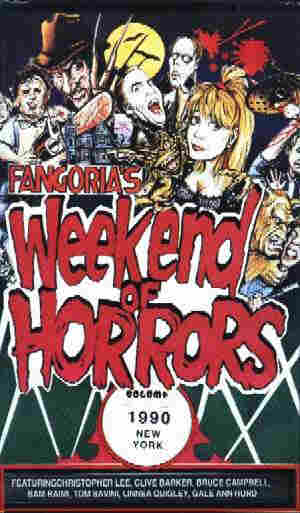
Fangoria's Weekend Of Horrors
Platform performance at Fangoria's Weekend of Horrors, New York, 20-21 January 1990
"The most often asked question is, 'Don't you have - ' No. The most often asked question is,
'Where do your ideas come from?', that's the most often asked question. None of you ask it,
please, because I don't have a fucking clue!
"'Do you not have nightmares?' I always say my dreams are other people's nightmares
because it seems to me we are gathered here because we like the perverse, we feel at
home with the dark, we feel at home with the monstrous. I think it's time we actually
stand up, even in larger numbers than these, possibly in Congress. I think Fango should
have a senator, the Fango representative who could go into the Oval Office every once in a
while and whisper in George's ear, 'You know, you're not being real nice on monsters at
the moment, George. Forget Noriega, what about the undead?'"
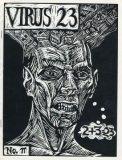
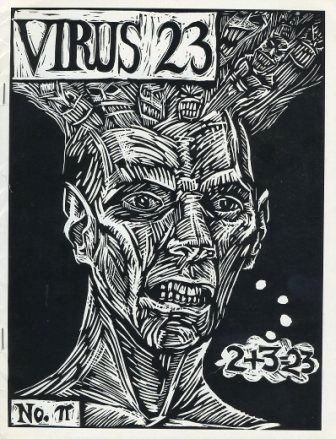
Virus 23, No Pi, Fall 1990
Fangoria's Weekend Of Horrors
Q&A session at Fangoria's Weekend of Horrors, New York, 20-21 January 1990 transcribed by Donald David in Virus 23, No Pi, Fall 1990
"I work in a very bright room which faces onto a busy street. I enjoy the fact that I'm doing this incredibly strange activity, letting my imagination go, in exactly the same way I would have studied biology when I'd been in school, with the sun pouring in on my desk. I will work at any hour, but I prefer to work in the daylight, it gives me nicer ideas... There are lots of things to do in the dark, but writing isn't one of them!"
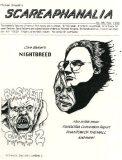
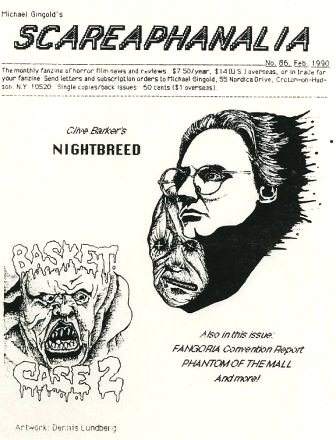
Scareaphanalia, No 86, February 1990
Fangoria's Weekend Of Horrors
Q&A session at Fangoria's Weekend of Horrors, New York, 20-21 January 1990 transcribed by Michael Gingold in Scareaphanalia, No 86, February 1990
"It's been said that filmmaking is like an orgy but writing is like masturbation, which I suppose is true: you use one hand and wind up with a stain on a piece of paper..."
Clive Barker
By Stanley Wiater, Dark Dreamers: Conversations With The Masters Of Horror, 1990
"In truth, I don't think I've had a nightmare for years and years and years. I've had a
few dreams which have left me uneasy in the negative sense, but there are also dreams of
unease which are hugely inspiring. Inevitably, one dreams of about the loss of something,
such as a loved one, and I suppose that comes close to the nightmare. But Idon't wake up
terrified that my body is being ripped up by one of my own creatures.
"I'm very aware of the relationship I have with my imagination, both consciously and
unconsciously. I think that my prime obsession has been the honing and sophisticating
and employing of my imagination. It's also a major place for self-explanation, the
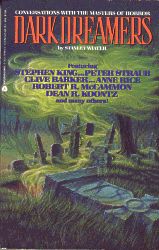 means by which I understand myself best.
means by which I understand myself best.
"Let's deal with the craft of storytelling. I think the whole purpose to telling a story
is to take the audience on a journey which they otherwise wouldn't get to take... Let's
go where only the imagination can take us! Some of those places are going to be
very dark and dangerous, and yes, they're going to be 'over the edge of the map,' if you
like. They are going to be the places where we can confront the forbidden. Some of
them are also going to be 'dreamscapes' where we can feel reassured, and where we feel as
though we have a glimpse of comprehension rather than of panic. I am as interested in
those areas as I ever have been; I'm interested in ecstasy and terror.
"I'm particularly interested in the place where one becomes the other. Those two
extremes are the twin beacons out there, and I'm most excited when I actually find that
I've reached one. Then I want to reach the other."
The Dissection Of Clive Barker
By David Richardson, The Dissection Of Clive Barker, Granada Television, 1990

"I've never really understood why so few writers of the fantastic want to write about sex. If we're talking about horror fiction, horror fiction has a lot to say about the body and about our relationship to the body and our control over our bodies - or the lack of control we have over our bodies - so I've always seen sex as being very much a part of fantastical writing. And, you know, it is fun to write, it really is! It puts a bloom on your cheeks at eight o'clock on a Monday morning..."
Good Morning America
By Charlie Gibson, Good Morning America, 25 January 1990
"I think we all of us have times when we go through times in our lives, passages in our lives, when we have great dreams so
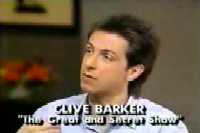 when we wake up we feel refreshed and great and we've been on flying journeys, dream journeys that have felt good. And
then we go through nightmare times, we go through times when we wake up in a cold sweat at three o'clock in the morning
and maybe we're not even quite sure why. I think our subconscious is always telling us stuff and the great thing about fantasy
fiction, about horror fiction, is that it allows us the stuff of our subconscious to erupt into book form or into a movie form...
when we wake up we feel refreshed and great and we've been on flying journeys, dream journeys that have felt good. And
then we go through nightmare times, we go through times when we wake up in a cold sweat at three o'clock in the morning
and maybe we're not even quite sure why. I think our subconscious is always telling us stuff and the great thing about fantasy
fiction, about horror fiction, is that it allows us the stuff of our subconscious to erupt into book form or into a movie form...
"We're not hypocrites in our dreams, we don't hide anything from ourselves in our dreams. If we can touch them, if we can
interpret them - and the interpretation of dreams is one of the oldest skills known to man, there's always been people out there
who've been trying to make sense, long before Freud, long before psychoanalysis, there have been people - shamans - in tribes
who've made sense of the tribal dream. In a way this kind of fiction now is again making sense of the tribal dream - taking what's
working in our subconsciouses, in our culture, and trying to make sense of it."
Deliciously Terrifying
By Martin Booe, USA Weekend, 26-28 January 1990
"I'm not writing horror to reassure people that the status quo is right on. A lot of horror is written to reassure people the values they bring to the book are fundamentally correct. For instance, that goodness will prevail. To me, the great glory of horror fiction is to sell us on a vision, not of the way the world is, but the way the world might be. I don't think of myself as a horror writer. The term is reductive. I'm a writer of dark fantasy."
Clive Barker
By Lance Chilton, Fax, 29 January 1990
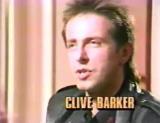
"The stuff I loved as a kid was the stuff of the imagination, was the stuff that could only exist on the page, could only exist on the screen. It seems to me that our imaginations are increasingly wizened - because of television, because our education system kicks it out of us - and it becomes important to hold onto what our minds can create...
"I don't have much of a social life, I don't have much of a passion for anything but the business of making this fabulous stuff - and I mean 'fabulous' in the proper sense of the word: the stuff of fable."
Hot Writer Barker Tones Down Gore
By Henry Mietkiewicz, The Toronto Star, 30 January 1990
"I'm like a comedian who has already told a whole bunch of jokes and doesn't want to tell
them again. It's an interesting thing, though, about my earlier fiction, because there are
an awful lot of writers out there who spend more time than I do describing the way cartilage
grinds against bone. But I'm the one with the reputation. I suppose it's because I called my
first stories The Books Of Blood, which was fairly up-front. And even though my fiction
doesn't deal, for the most part, with the
minutiae of physical disintegration, it does tend to make those experiences very intense
for the reader. Still, being known for gore is not really a problem. After all, my future books will certainly
have their share of chills, scares and stuff that goes bump in the day. It's just that the
emphasis will be different.
"I don't even think I'm writing horror fiction any more, it's what you could call fabulist fiction -
fiction of the imagination. I say 'fabulist', because it isn't exactly fantasy, which conjures up
images of The Lord Of The Rings. 'Fabulist' is a term my publisher chose, and I quite like it.
It's not a term that most book buyers would be familiar with, but that's okay. If we use it
often enough, it'll become common parlance."
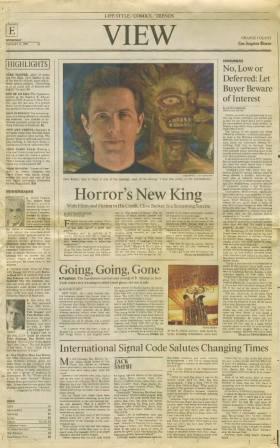
Horror's New King
By Bettijane Levine, Los Angeles Times - View Section, 31 January 1990
"People ask me, 'How can you love a scorpion?' Well a scorpion is a fabulous, wonderful, totally alien thing. What's important is to celebrate the whole world, the whole thing. We live in this wonderful, imaginative environment, often sealing ourselves off from it in little cells of homogenised life. I like people to look at the real world and see how strange it really is. A pet dog, for example, is very strange. He's another entire species who has chosen to be with you, chosen this very primal liason that goes back to the caveman. I tell people, 'You have a tame descendant of a wolf living in your house, with its own thoughts and its own views and yet there's this wonderful unification with that strange thing.'"
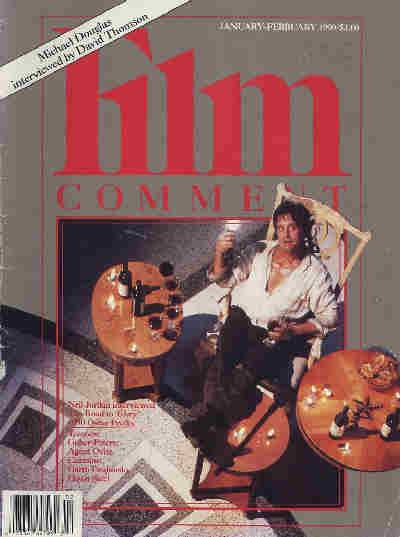
Future Shockers
By Maitland McDonagh, Film Comment, Vol 26, No 1, Jan-Feb 1990
"I never understood the thing with Pinhead. Truly, from the bottom of my heart, I never expected the stuff on the sneak preview cards: 'The guy with the pins in his face is real sexy'. 'Love the dude with the pins in his face'. I intended the Cenobites to be elegant, strange but sexy?"
Nightbreed
By Maitland McDonagh, Andy Warhol's Interview, February 1990
"I looked at David [Cronenberg] and thought, 'Yeah, I can believe this guy could be a psychiatrist. But I also believe that if the moon were also at its fullest he might forsake his healing ways,' shall we say."
Creature Comforter : Clive Barker
By [ ],
MTV to go, February 1990
"Psychoanalysts will always drive you off the edge, won't they? I think that's their function in life. [The antagonism in Decker's role] is significant only in the sense that I think you have to be pushed to the edge to accept certain things. And Boone, who has sort of held on to his sense of the world, his sense of what is real, discovers that something else is real as well. Not that what went on before wasn't real, but the reality was wider and larger and more extraordinary than he'd ever thought. And I think that's one of the things which informs a lot of fantastique fiction - the idea that the world is not only stranger than we know, but stranger than we can know."
News: Culture
By Cree McCree, Self, February 1990
"[Working in Horror] is a great way to dispel anxieties which otherwise might build up and I think people who are at peace with their imaginations - particularly the forbidden elements - tend to be more sweet-natured and accessible than people who aren't."

Clive Barker
By Cary MacDonald, Conversation, February 1990
"The kind of fiction that I write is a fiction of the imagination: that is, it's a fiction which is about the reconfiguring of realities in some way or other. I don't set out in my fiction to reproduce the texture of life as we will be living it when we step outside the studio door. I am attempting to make a fiction which is about the way I fear it might be, or the way I hope it one day will be, which is a whole different kind of fiction that I'm writing - I'm writing a fiction which is using speculation, using anxiety, using maybe a little vision, a little psychosis, a little insanity, mingling them up and saying, 'OK now, how does the world seem if it's seen in this particular way? How can I communicate the intricacies of those reimagined worlds to an audience, to a reader?'"
The Pat Sajak Show
Transcript of a TV appearance on The Pat Sajak Show, [February] 1990
"We fear the same things: we fear getting old; we fear losing our sanity; we fear losing our loved ones. You know, those are fairly solid things. But I think there's another thing that goes on which I think is real important - particularly for somebody like me who makes this kind of thing - that we actually enjoy getting scared as well. There's a real ambiguity here, a little part of us says, 'No, no, no. I don't want to see that, I don't want to see this movie' - I've tested Nightbreed with audiences who watch it like this... And there's a real ambiguity there and I love that as I, as a maker of these things, get great pleasure, great pleasure, out of scaring people and them coming out of it shaking and saying, 'I had a great time.' "
Fright Times For Britain's Teller Of Dark Stories
By Gene Miersejewski, Flint Journal, 1 February 1990
"I am of a generation that was introduced to the fantastique at least as much through the movies as literature. Because of that, I write very visually."
British Writer's Having A Bloody Good Time
By Ron Marz, Sunday Freeman, 4 February 1990
"Sex fascinates me. No big surprise. It is one of the strongest motivating forces in our lives, and it drives us to the most extraordinary lengths and activities, and that's exciting for itself.
"I think my main preoccupation with sex - besides the fact that it's great fun to write about - is that it drives characters to altered states of consciousness. Sex changes completely the way we look at the world; the way we look at ourselves and the world. And to that extent, it allows characters to act in ways they absolutely wouldn't under any other circumstances."
Clive Barker Shuns Labels, But He Does Admit To Weird
By Jeff Strickler, Star-Tribune Newspaper of the Twin Cities, 7 February 1990
"Everything I do can be generally classified under the description of weird. The description of weird is all-encompassing. It fits
both me and this place inside of me, some dream place...
"I'm back in my childhood, back in a state of adventure where anything can happen: 'We're not in Kansas anymore, Toto.'
A kid's mind works like this all the time. The world is soft, it can be pulled and remade any way you want. But as we grow
older, we're taught that facts are solid. One of the interesting things about higher physics is that now they're discovering that
everything is soft again. The children and the poets were right."
Clive Barker's Aim: A Mixture Of Horror And Fantasy
By Francesca Coltrera, The Boston Herald, 11 February 1990
"My monsters tend to be good in bed and they tend to survive. I'm not an author who writes about the creatures of my imagination as being evil or alien. They don't represent minorities to be banished and destroyed. They represent things that operate under the conscious.
"It's almost as if the monster is some incredible parody of our senses. He, she or it has naked appetites for blood, for sensual experience, loves the night when mysteries and forbidden activities take place, loves the line between pleasure and pain, loves the unnatural sexual act.
"I see nothing on that list I want to run from...
"I'm not interested in playing with people's fears. I'm interested in giving them adventures, which are sometimes scary, but are often erotic, sometimes funny [and] wonderful."
Clive's Art
By Wilder Penfield III, The Sunday Sun, Toronto - Showcase Section, 11 February 1990
"Such simple dichotomies [as Good and Evil] endanger us, and our culture feeds upon them... the new villainies on the horizon are every bit as simplistic as ever... What I'm concerned to do is make sure that people don't think that the packages that shape our lives for good or evil come in such obvious shapes and sizes that you can see 'good' on the horizon and say, 'Ah, here comes the cavalry...'
"In my books it's impossible to close the door on the nightmare. It's a bit like having a nervous breakdown and thinking you'll never be the same again. Anybody who's come close to that - and I have - knows very well that once you look into the abyss... the abyss gazes back.
"There's something down there.
"And it's watching."
Horror's New Breed
By Bruce G. Hallenbeck, Metroland, 15 - 21 February 1990
"I think that the experience of horror, whether for the writer or the reader, is useful... It works because it touches a universal chord in all of us - either people like Poe or H.P. Lovecraft were examples of people whose psyches were extremely off-base, or else they had a talent to set this stuff down that others didn't have.
"I stand somewhere between those two theories. I don't think of myself as being a particularly outlandish personality. Equally, I'm aware that there are obsessions and preoccupations within me that are perhaps more loudly articulated in my psyche than they are in others. You only have to get drunk with a whole group of friends, or strangers, to discover that these things are in other people's heads too."
Monster-Maker On The Loose
By Martin Burden, New York Post, 16 February 1990
"With Nightbreed the MPAA told me, 'But the monsters are the good guys.' I said, 'Well, I like monsters more than I do most people.' I really do. I am out and out saying, 'Look, the monsters are cannibals and shape changers and blood-lusting fiends - but look, they're better than some human beings...'
"We have about a hundred monsters in the film. In one scene the girl walks through a wonderland of monsters, dozens and dozens of them - thin creatures, fat winged creatures, some covered with blood, some covered with goo, with tentacles, without faces, without hands... really exciting."
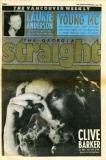
Clive Is A Monster Talent
By Steve Newton, The Georgia Straight, Vol 24 No 1156, 16 - 23 February 1990
"I'd been thinking of setting the book [Cabal] in America, but then I thought, 'Boy, nobody knows what goes on in northern Alberta; nobody has the slightest clue what happens north of Calgary. I could invent anything and nobody'll question it.' It gives you an incredible freedom.
"[Nightbreed] is a much jumpier movie than Hellraiser. I'm hoping that on the 16th, when it opens at 1,500 cinemas across North America, the collective asses of America will be rising from their seats at certain key points in the movie."
Beneath The Shroud: Shedding Light On Dark Shadows
By Alex Demyanenko, Village View, Los Angeles, Vol 4 No 27, 16 - 22 February 1990
"I think [Nightbreed] is a more complicated movie [than Hellraiser]. I think it has more visions. I don't approach movies as my primary career. I see it as another way to get my internal geography out to the world. And so the things which drive me to make movies are the obsessions I want to get out. Say with Hellraiser - Sadomasochists from Hell was the title I really wanted - I wanted to feel something that was fetishistic. I had fun doing it and would have liked to have more money to spend on the fetishes.
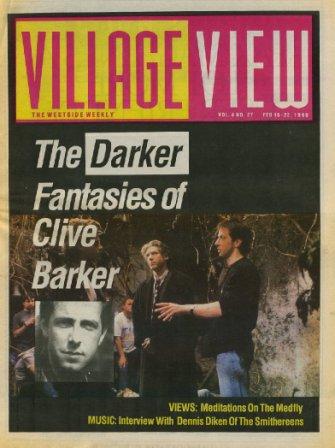 "In Nightbreed I wanted to make a film that was damn scary and deeply weird, and came from the side of the monsters. The movie, trust me, is weird, and it is on the side of the monsters. I'm proud of the movie. I think Danny Elfman wrote an incredible score, the special effects are great and I think the performances are very solid. Whether Siskel and Ebert will agree is a moot point...
"In Nightbreed I wanted to make a film that was damn scary and deeply weird, and came from the side of the monsters. The movie, trust me, is weird, and it is on the side of the monsters. I'm proud of the movie. I think Danny Elfman wrote an incredible score, the special effects are great and I think the performances are very solid. Whether Siskel and Ebert will agree is a moot point...
"Who doesn't like to be well-reviewed? But Hellraiser was met with incredibly mixed reviews that went from 'very original horror movie' to Joe Bob Briggs' favourite movie of the year, to 'this guy should be locked up.' I think if you make movies that are personal in the sense of commercial movies that are not formulaic, you're bound to have a lot people who won't get it...
"There's nothing worse than someone saying, 'That was a really nice movie.' Things can sometimes break out of a genre because they push the envelope of taste, of propriety, of convention. I think Nightbreed is like no other horror movie out there. Movies are such a conservative area to work in."
Clive Barker: Hell-Raising Author Has Two New Projects
By Dan Pearson, Sunday [supplement], 18 February 1990
"[The Great and Secret Show] has some dark and secret parts, but the best journeys do...
"It's a title I love because it implies exactly what the book is about. That is something that clearly my fans and,
indeed, I as a reader enjoy, and that is being taken on a flight, being taken on a journey.
"I have a very clear idea of where I want to take these characters and the mythology that underpins them. I knew I
couldn't investigate (every aspect) without making the book twice the length that it was.
"I don't know even now if it is (part of) a trilogy. It could be a quartet. I knew there was a lot more to tell."
Director Horrified By Nightbreed Publicity
By Joe Leydon, The Houston Post, 23 February 1990
"It's horrible, absolutely horrible. It seems to me that we made a movie which, for all its flaws, is at least different from the rest of the stuff that's out there. And then what do they do? They package it and sell it like it was exactly the same as everything else that was out there, and that's very depressing, very distressing...
"It was being marketed as something it isn't, and the people who were coming in were saying, 'Hey, this isn't the movie we paid to see! Where's the girl in the shower? Where's the slasher movie stuff?' They hated the movie. Well, maybe they don't hate it - some of them have a good time and are entertained by it - but it's taking time for them to be convinced. And in the time they're being convinced, twenty minutes of exposition is going by...
"The movie sort of takes it for granted that you're going to like these monsters, you know? So I decided not to spend a huge amount of time making a case for these creatures. I just said, 'OK, here it is guys, here's the weird stuff, here's the world: enjoy.' And a certain number of people have come to the movie and have enjoyed it - had a great time, in fact...
"I think it will prove to be a hell of a midnight show, as Hellraiser proved to be, but that's cold comfort now..."
Clive Barker: Dreamweaver
By Darrell Shoults, St. Louis Sun, 23 February 1990
"I like to think of myself as creating dreams, where the unreal is accepted.
"So many horror or fantasy movies spend so much valuable narrative time - the important spectacle time - debating whether the thing is real or not. These are the boring exposition scenes in so many horror movies, where people sit around saying, 'You know, I really don't believe in vampires,' or whatever. In my written fiction and my movies, I say, 'Screw that.' I say, 'Here it is guys. Enter a world in which this is going to happen... I'm sort of like Fellini, saying 'Here's this weird junk, I'm putting it in front of you. Take it as you will.'
"My favourite movie of all time is Fantasia. It has that same dream-like quality. I mean, hippos don't dance. But there they are, right in front of you. So logic falls away. You have to be willing to buy into this fantasy world from the beginning...
"Part of the fun for me of making these kind of movies - and I've only done two, but I had a great time doing them and I'll certainly do another if someone will give me the money - is to create this world and make it real for people, to make a dream state and lay it out there for an hour and a half."
Barker Creates Own Horror Niche
By William Kerns, Lubbock And Avalanche Journal, 25 February 1990
"My favourite movies are the ones where there's no basic narrative in which people stand around explaining things. I like the ones where ideas and visuals just fly out and bounce off the walls, movies that have their own internal logic. For example, I love Fantasia, but there's no way you can enjoy this if you insist on asking, 'What is the motivation of the hippo dancing?' You just have to accept it."
A Man And His Monsters
By Linnea Lannon, The Detroit Free Press, 7 February 1990
"Would you go and see a movie about the guy who finished off Dracula? No. You'd go see a movie about Dracula. Yes, we kill Dracula at the end of each movie but we always bring him back. We characterise monsters as these things we kind of like - the forbidden part of us likes. Would I prefer to be the guy who can attract virgins from across a crowded room just by moving his eyes, lives forever, and turns into a wolf? Yes, yes, yes! I think I want that!"
Breeding Ground
By [ ], Fantasy Zone, No 6, March 1990
"I've always loved the demons. I've always loved the vampires. I've always loved the dark side. I want to celebrate the weird."
Nightbreed
By Bob Morrish, Cinefantastique, Vol 20, No 4, March 1990
"We felt there were some characters audiences were going to like quite a lot, but as things developed, we killed off one of those characters and then thought, 'that may not be such a clever idea,' so we decided to resurrect him. I love movies, you can just resurrect people, just like that."
Interview From The Dark Side
By Robert Crowther, Jr., Hiatus, 1 March 1990
"We spend a third of our lives asleep. I spend ten hours of my waking life imagining - sometimes very dark stuff, 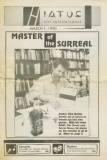
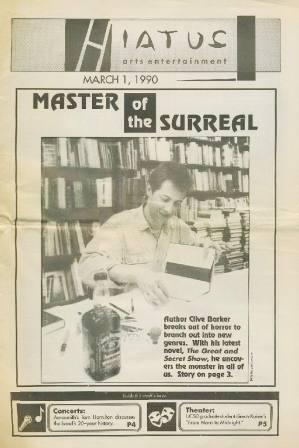
Hiatus, 1 March 1990
and sometimes very bright stuff - that sort of combination is going on all the time. So in a sort of way, I feel as if the invasion of strangeness into the ordinary is something that reflects the texture of my days.
"I believe we co-exist with all sorts of extraordinary forces. I believe we live in one plane of reality which is, if you like, one groove on a record, and there are melodies being played to right and left of us all the time.
"I believe we are living a stretch of physical life which will have all kinds of spiritual consequences when this life is over. I know I sound like Shirley MacLaine on ludes here, but I do have a sense that this is just the beginning of an adventure, not the end, nowhere near the end!"
Brit Clive Barker Masters Horror In Movies, Books
By Gene Mierzejewski, Chicago Sun-Times, 1 March 1990
"Fantasy literature addresses the paradoxes and ambiguities that have shaped mankind. It's a genre that is looked down on, but it can tackle serious subjects in an entertaining fashion."
Barker's Demons A Blessing To Genre
By Bob Strauss, Los Angeles Daily News, 2 March 1990
"I love the fantastic on screen and there are some things you can do uniquely on screen. King Kong, the
book, would not be of interest to me. I honestly think that The Wizard of Oz is a better movie than it is
a book. A movie is very presentational. There are lots of things that are almost fascistic about the
filmgoing experience: It sits you down, slaps your face and tells you, 'There it is.' There are liabilities
to any kind of art form that demands the kind of control over you.
"But Fay Wray picked up by King Kong is a wonderful experience. So is the Yellow Brick Road, and
Karloff's first appearance as the monster and the unveiling of Elsa Lanchester (as his bride). The
wonderful thing about putting wonderment on screen is that you can say: 'Here it is, guys. Here
are these strange, extraordinary sights.'"
Fast Track Q&A
By Cheryl Lavin, Chicago Tribune, 4 March 1990
"As human beings, it's our lot to be frail. We're at risk both mentally and physically. Our sanity is always teetering on the edge of some abyss or another. At least mine is. And physically, we know we bleed and bruise easily. We're born into a state of fear. The fiction of fear addresses that anxiety in a safe environment. It allows us to confront those things that scare us and to play out such questions as, 'What would happen if?' I think that's a very important process, therapeutic, even."
Secret Show Marvelously Complex
By Mark Graham, Rocky Mountain News - magazine, 11 March 1990
[re. shift away from horror] "A comedian who does the same shtick show after show, year after year, might get some laughs and even make a lot of money, but he would bore himself."
The Inventor Of Techno-Dante
By Philip Nutman, Toxic Horror, No 3, April 1990
"There is a large, sweeping religious imagery in my work. And that's
true of a lot of horror. One of the principal components of this sort
of material is the conflict between the holy and the unholy, the sacred
and the profane. That kind of imagery wanders through the classics
like Frankenstein and Dracula. These are books that deal very much
with the holy and the unholy, with what is God's work and what is the
Devil's work. I think it's always been there in the genre. Only
lately this has stopped being true - because people don't believe in
these religious icons anymore. Now we have movies where the vampire
can reach out and grab the cross and not be burned by it. This was
true in Fright Night. A movie based on one of my stories, Rawhead Rex,
has a priest devoured by a creature who is completely unimpressed by
the Christian iconography. I think that reflects a new audience
cynicism concerning religious matters. The days are gone when the Van
Helsing character can pull out some holy water or a crucifix and the
force of evil will automatically retreat... Now the trick is to make
the religious aspects fresh for an audience that is often reluctant to
deal with it. In Hellraiser, for example, the Cenobites form a weird
sort of priesthood. At least, that's how they come across. They have
their rituals, they have their rites, they have their bag of tricks.
Pinhead comes across like the High Priest of pain. Theirs is a
perverse religion, but nonetheless a religion."
Clive Barker - Lord Of The Breed
By Philip Nutman, Fangoria, No 91, April 1990 (Note : interview took place in June 1989)
"One should be wary of pretension. I don't want people to see me as some form of higher literary life. My primary concern is to tell a good story and I'm just responding to the world around me and what flows through my subconscious onto the page or screen. My passion for classical literature is no stronger than my passion for B movie, film noir, AIP exploitation movies, Hammer Gothics or Disney films."
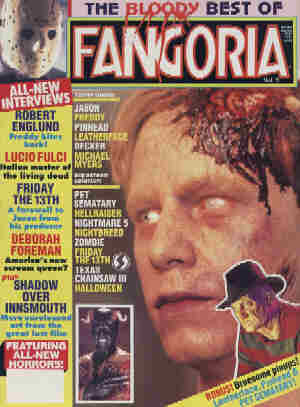
Nightbreed - The Reshoot
By Philip Nutman, (i) Fangoria, No 91, April 1990 (ii) Bloody Best Of Fangoria, No 9, 1991
"The conclusion reached at the focus sessions after the test screenings was that this is a wildly original, highly disturbing film, the like of which has not been seen before. The main problem was that initially we were not realistic about the budget."
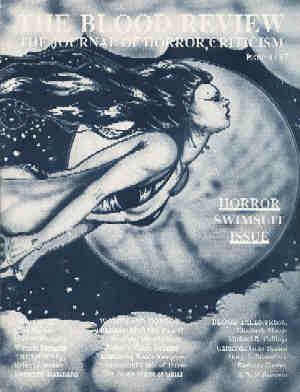
In Search Of A Great And Secret Place To Relax
By Ruben Sosa Villegas, The Blood Review, Vol 1 No 3, April 1990
"I have never been reviewed well. I don't make tidy, easily-understood work in any medium. You have to have rhinocerous skin... Reviewers go into horror movies pre-disposed to dislike them. Reviewers will see the different angle and are twice-disposed to dislike it. Reviewers that like it, get it. Nightbreed is a new, different kind of movie, less visceral. It has a fantastical premise. Hellraiser - three years later - there are some reviewers who were against it who now admit it was a benchmark movie..."

Tales From The Script
By Dave Hughes, Speakeasy, No 108, April 1990
"I've been made to learn that you can't make movies that break the mould without incurring the wrath of the studio."
The Great Life
By George Christy, The Hollywood Reporter, 12 April 1990
"Take a cadaver who's brought to life, raging against his will... strange, yes, but it makes sense in every culture when you consider the popularity of Frankenstein. Stories like that reflect a constancy of structures and shapes - they may be simple or sophisticated, but, at best, they're a little bit of both. Aren't fairy tales simple and sophisticated at the same time - and look at the power these images have to move children. They touch nerves, and it dosn't matter if they're crude. Oftentimes the crudeness adds to their power. Like African art that reaches a primal chord in us, books and movies do the same, but when movies get too technical they don't move us as much. Those early Walt Disney films had a power - Fantasia with the Night on Bald Mountain sequence is unforgettable, when the top of the mountain becomes the devil opening his wings and coaxing the dead out of their graves, I've remembered it all my life, it releases a raw energy that comes out of a deep place touched by fairy tale, folklore, fantasy, a place not susceptible to analysis or intellectualising. Our dream place."
Cheap Chills
By Maralyn Lois Polak, Philadephia Inquirer Magazine, 15 April 1990
"Ah, really frightened? Well, I was a Caesarean birth, and I struggled for 24 hours to get out. I think probably then [was the first time I was frightened]. I don't have a conscious memory of that, but I'm absolutely certain I have a subconscious one. And my mother almost died, and I almost died, so I think under certain forms of therapy I'd probably rediscover that experience. I don't particularly want to. I might even be writing something out of it."
Horror's Hardcore Hero
By W.C. Stroby, Asbury Park Press, 15 April 1990
"The Great and Secret Show is complete unto itself. The book is a complete arc; it [The Art]'s much more a series
than a serial. I haven't left Pearl White tied to the tracks. So I feel like it'll probably be the book after next that I'll go
back to it. My feeling is the mythologies will be there, I'll return to them at some point. Now there are new
obsessions coming to the fore...
"I feel like I've done a lot of stuff in a short time. There's been a lot of preoccupations which have been explored and
developed. But I'm having a good time. This last year of work has had wonderful things in it, it's been an
embarrassment of riches...
"This year should be a little bit more sedate. I'm fairly itching to get at the new book [Imajica]. So
I'll go back to London in the drizzle and be quite happy."
Laughing All The Way To The Blood Bank...
By David Sexton, The Sunday Correspondent, 22 April 1990
"Somebody once said to me, 'If you wanted to create the ultimate horror story, what would you do?' and I said I'd take a baby and I'd put this child in a chair and do a time-lapse movie which would last 70 years. You'd just run the movie. You'd start with this pristine and fabulous thing which blossomed and became ever more fabulous, and around the age of 18 became as fabulous as it was going to get. And then..."
Mini-Interview: Clive Barker
By Glen Leon, Lights Out! The Robert R. McCammon Newsletter, Vol 1 No 4, May 1990 (Note: partial transcript of a Q&A by Barker in Vancouver, 8 February 1990)
"I never listen to music when I'm writing; I think it actually changes
the rhythm of what I'm writing. I think my style speeds up when I play
the samba. That may seem like nonsense, but I genuinely think that's
the case. In the last year I've been making a movie, so I've been
playing a lot of movie music, but I will play just about anything else,
and I do have a passion for the great singers. I love songs. I'm an
incredible sentimentalist - it's painful sometimes!"
Barker Raises Hell Again With Media Film Nightbreed
By Jim McCullaugh, Billboard, 12 May 1990
"What I wanted to do was confront the late-20th century horror villain with another older but more interesting tradition - the semi-mythological, shape-changing creature which in this film has dozens of manifestations. In a delirious, hallucinogenic way the movie is able to do that. I intended for a delirium where you moved at incredible speed and viewers would have a good time with it. There are some pretty weird sights on view. My favourite review was the one that called it an Indiana Jones odyssey on acid...
"I wanted to make a movie that celebrates the monsters - it's on their side from word one. They're comical, sexy and strange. Yes, they eat people and blood will flow. You end up preferring the monsters over the human beings. And we wanted to make sure the creatures didn't look like creatures people had seen before. They walk the line between repulsive and fascinating."





